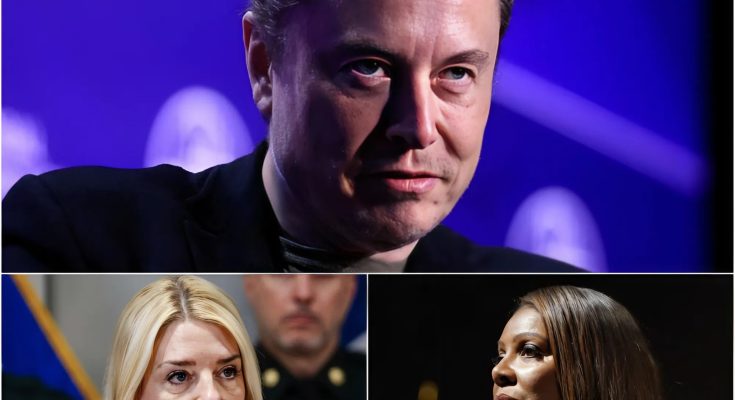In a gripping congressional hearing that sent shockwaves through Washington, Elon Musk laid bare what he described as “one of the most coordinated financial deceptions in modern federal history.” Backed by a trove of digital evidence, Musk exposed a hidden network of 42 duplicate entities funneling over $2 billion in misallocated federal funds, many registered to identical or nonexistent addresses.
The scandal implicates several government oversight agencies—and casts a shadow over New York Attorney General Letitia James, who Musk claims “knew, but failed to act.”
“This was not a software glitch. It was a system built to hide itself,” Musk testified.
The “Red Dossier” and a Missing Paper Trail
The revelations began with what Musk referred to as the red dossier—a digital folder he claims surfaced during an internal audit tied to SpaceX’s public-private infrastructure collaborations.
Inside: metadata from a federal funding pipeline, including dozens of entries flagged with backend “suppress display” tags—hidden code designed to bypass watchdog reporting systems.
Each entry linked to a different entity, yet many shared addresses, EINs, and identical invoice language. Some entities were found registered to P.O. boxes. Others, to vacant buildings.
“There is no universe where 42 different agencies end up using the same address and apply for the same funding categories—unless someone intended for it to happen,” Musk stated.
Congressional Hearing Turns Contentious
As Musk delivered his testimony, tensions in the chamber escalated.
Members of the House Oversight Committee questioned the legality of how the data was obtained. Musk, in response, claimed his companies had legitimate access through federal contracts and data-sharing protocols.
Committee chair Rep. Leon Crenshaw (R-TX) defended the importance of the evidence, stating, “It doesn’t matter how uncomfortable this is—what matters is that the data appears to show a system-wide failure to monitor where taxpayer dollars are going.”
Election Cycles and Suspicious Timing
One of the most disturbing patterns Musk revealed was a sharp spike in disbursements leading up to the 2022 and 2024 elections.
These grants—often labeled “emergency green equity” or “local resiliency funds”—went largely unreported in public audits, yet totaled hundreds of millions across just a few months.
“The timing is not a coincidence,” Musk said. “This was engineered to fund political agendas off the books.”
Letitia James Under Scrutiny
Musk’s testimony included references to internal memos and audits from the New York Attorney General’s office, which, he alleges, flagged irregularities but were later archived without action.
Though Musk stopped short of accusing James of direct complicity, he suggested she “allowed patterns of misappropriation to persist under her watch.”
Letitia James’s office responded with a brief statement denying wrongdoing and asserting that “no credible evidence has been presented linking our office to misallocation of federal funds.” But calls for her testimony under oath have already begun circulating within congressional leadership.
Suppression Code: “Display = FALSE”
Technologists brought in to assist Musk’s team say the most damning element may be a set of internal commands embedded in federal financial software, used to suppress certain transactions from appearing in public audit portals.
“These commands don’t occur naturally. They were inserted. And whoever wrote them knew exactly how to keep them hidden,” said Edward Cho, a former cybersecurity official now advising on the case.
The committee has since ordered a third-party review of all government platforms using the tagged suppression protocol.
Video Leak Raises Stakes
Midway through the hearing, a private recording surfaced showing two Democratic strategists discussing how to “delay oversight conversations” tied to funding logs “until after Q4.”
Though the context and authenticity of the clip remain under review, the leak intensified pressure on lawmakers across the aisle to demand full transparency—and possibly appoint an independent federal prosecutor.
Public Reaction and Demand for Reform
As news broke across national outlets and trended on social media under hashtags like #AuditTheAgencies and #FederalFraudFiles, the public response was swift.
Polls conducted 24 hours post-hearing showed that 62% of registered voters now support an independent audit of all federal infrastructure and climate-related spending from 2020 to 2024.
Musk’s appearance, once dismissed as a distraction by some commentators, is now being hailed as a watershed moment for public accountability.
“He may be a billionaire, but in that room, he was a whistleblower,” said Fox Business host Rachel Anders. “And Washington wasn’t ready for it.”
A Crisis of Trust
In his closing remarks, Musk addressed not just the committee, but the American people.
“If this can happen with federal money—if billions can move through invisible doors—then we’ve lost the most basic control of our democracy,” he said. “This isn’t about politics. It’s about trust.”
As lawmakers prepare for further hearings and possible subpoenas, one thing is certain: the story is far from over.
